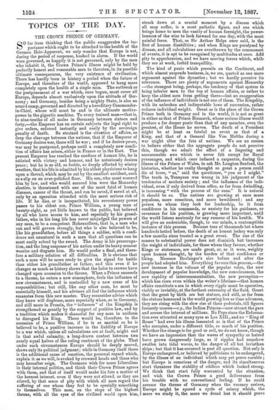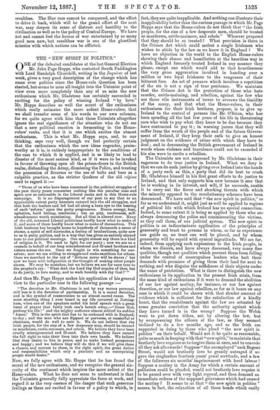TOPICS OF THE DAY.
THE CROWN PRINCE OF GERMANY.
S0 far from thinking that the public exaggerates the im- portance which ought to be attached to the health of the German Heir-Apparent, we only wonder that Europe is not, during the period of suspense, hushed in alarm. If the world were governed, as happily it is not governed, only by the men who inhabit it, the Crown Prince's illness might be held by perfectly honest and reasonable men to threaten, in its possible ultimate consequences, the very existence of civilisation. There has hardly been in history a period when the future of Europe, and therefore of the world, appeared to hang more completely upon the health of a single man. The outbreak or the postponement of a war which, once begun, must cover all Europe, depends almost exclusively upon the attitude of Ger- many; and Germany, besides being a mighty State, is also an armed camp, governed and directed by a hereditary Commander- in-Chief, whose will must be and is the ultimate motive- power in the gigantic machine. To every trained man—that is, to nine-tenths of all males in Germany between sixteen and forty,—the Emperor has on certain subjects the legal right to give orders, enforced instantly and easily by the sovereign penalty of death. So strained is the situation of affairs, so deep the cleavage between the nations, that if the Emperor of Germany desires war, there will be war ; and if he desires peace, war may be postponed, perhaps until a completely new condi- tion of affairs has arisen, either in France or in the East. The present Emperor has reached the confines of human life, he is satiated with victory and honour, and he notoriously desires peace ; but he is so old, so feeble, so deeply affected by wintry weather, that his life is admitted by his ablest physicians to hang upon a thread, which may be cut by the smallest accident, such as a slip on an over-polished floor. His son, who must succeed him by law, and who would succeed him were the Monarchy elective, is threatened with one of the most fatal of human diseases, cancer of the throat, and can be saved, if saved at all, only by an operation attended with the most serious risk of life. If he dies, or is incapacitated, his reversionary power passes to his eldest son, Prince William, a young man of twenty-eight, as yet little known to the public, but believed by all who have access to him, and especially by his grand- father, who in his long life has never misjudged the powers of any man, to be a competent Hohenzollern, that is, a man who can and will govern strongly, but who is also believed to be, like his grandfather, before all things a soldier, with a confi- dence not unnatural in such a man that all questions can be most easily solved by the sword. The Army is his preoccupa- tion, and the long suspense of his nation under its heavy armour wearies and disgusts him. He would prefer a final, and there- fore a military solution of all difficulties. It is obvious that such a man will be more ready to give the signal for battle than either his grandfather or father, and this even if he changes as much as history shows that the heirs to crowns have changed upon accession to the throne. When a Prince succeeds to a throne, he enters a new atmosphere, feels the influence of new circumstances, and is controlled by a new sense of his responsibilities ; but still, like any other man, he must be essentially himself, and his advisers all feel the influence which emanates from this new master. They reconsider advice which they know will displease, more especially when, as in Germany, and still more in Prussia, the "influence" of the Kingship is strengthened so greatly by the support of positive law, and by a tradition which makes it shameful for any man in uniform to disregard his King. There would be, therefore, in the accession of Prince William, if he is as martial as he is believed to be, a positive increase in the liability of Europe to a war which, unless all calculations are at fault, might end in that awful calamity, a long-drawn contest between two nearly equal halves of the ruling continent of the globe. That under such circumstances Europe should be deeply moved, shows only its political judgment; while in Germany itself there is the additional cause of emotion, the personal regard which, explain it as we will, is evoked by crowned heads and those who may hereafter reign. The Germans wish for more Liberalism in their internal politics, and think their Crown Prince agrees with them, and that of itself would make his fate a matter of the keenest interest, even if they were not stirred, as they are stirred, by that sense of pity with which all men regard the suffering of one whom they feel to be specially something to themselves. This man, on the steps of the highest throne, with all the eyes of the civilised world upon him,
struck down at a crucial moment by a disease which all may suffer, is a most pathetic figure, and one which. brings home to men the vanity of human foresight, the power- lessness of the wise to look forward for one day, with the most painful force. That, as Sir Arthur Helps once said, is the first of human disabilities ; and when Kings are paralysed by disease, and all calculations are overthrown by the commonest of events, it is apt to be recognised by multitudes at once. Add pity to apprehension and we have moving forces which, while they are at work, forbid tranquillity.
The kind of panic which prevails on the Continent, and which almost suspends business, is, we see, quoted as one more- argument against the dynasties ; but we hardly perceive its relevance. There are plenty of arguments against Monarchy —the strongest being, perhaps, the tendency of that system to bring inferior men to the top of human affairs, or rather to keep the ablest men from getting there—but an exaggeration of the influence of individuals is not one of them. The Kingship, with its unbroken and indisputable laws of succession, rather reduces individual weight. Great as is the place of the Crown Prince both in Germany and in the world, it is not no great in either as that of Prince Bismarck, whose serious illness would produce a far deeper panic than that of any member, even the greatest, of the House he serves. The death of a President might be at least as fateful an event as that of a King, and that of a General like Von Moltke during a war might alter the fate of nations. We see no reason to believe either that the aggregate people do not perceive this, though we admit the effect of a lingering and unreasonable awe which is never felt except for Royal personages, and which once induced a carpenter, during the illness of the Prince of Wales, to ask Mr. Langton Sanford, the historian, whether he really thought so great a person could die of fever, "as," said the questioner, "you or I might." The truth is, Tennyson was wrong in his judgment of the tendencies of modern society ; and the influence of the indi- vidual, even if only deiived from office, so far from dwindling, is increasing "with the process of the suns." It is natural it should be so. The nations arc growing at once more populous, more conscious, and more bewildered ; and any person to whom they look for leadership, be it from confidence in his commands, or anxiety for his guidance, or reverence for his position, is growing more important, until the world listens anxiously for any rumour of his health. We will give an undeniable, though, to our minds, a contemptible instance of this process. Because tens of thousands bet where hundreds betted before, the death of an honest jockey was only a few months since treated as a great event. The rise of the masses to substantial power does not diminish but increases the weight of individuals, for those whom they favour, whether Kings or statesmen, are made great, or, as it were, weighty upon human thought, by the burden of that confidence or liking. Measure Boulanger's size before and after the people had adopted him. Everything favours this process,—the new increase in the volume of the popular voice, the new development of popular knowledge, the new consciousness, the new rapidity of intercommunication, the new perception— which has risen even within the writer's lifetime—that human affairs constitute a sea in which every ripple must be operative, visibly or invisibly, at the farthest extremity of the fluid. Grant that the great by birth are but statues, and still, so far from the statues honoured in the world growing less as time advances, they are rising with the slow rise of their pedestals, till figures formerly unseen—e g., the Indian Princes—now attract the gaze and arouse the interest of millions. No Pope since the Reforma- tion ever attracted so many eyes as Leo XIII., and no "King of Rome" had ever his illness lamented as is that of the Prince who occupies, under a different title, so much of his position. Whether the change is for good or evil, we do not know, though we have an impression that the waves of sympathy or hatred have grown dangerously large, as if ripples had somehow swollen into tidal waves, to the danger of all but leviathan ships ; but that it has occurred is past all question. Net only is Europe endangered, or believed by politicians to be endangered, by the illness of an individual which may yet prove curable ; but Europe is conscious of the danger, and its simultaneous start threatens the stability of edifices which looked strong. We think that start fully warranted by the situation, and wish the Crown Prince a good deliverance from his trouble with no conventional feeling. If he could assume the throne of Germany when the vacancy arrives, Europe might be spared a cycle of misery which, the more we study it, the more we dread lest it should prove
resultlese. The Slav race cannot be conquered, and the effort to drive it back, which will be the grand effort of the next war, may deepen its sense of distrust and hostility to the civilisation as well as to the policy of Central Europe. We have not and cannot feel the horror of war entertained by so many good men now, but resultless war is one of the ghastliest miseries with which nations can be afflicted.












 Previous page
Previous page